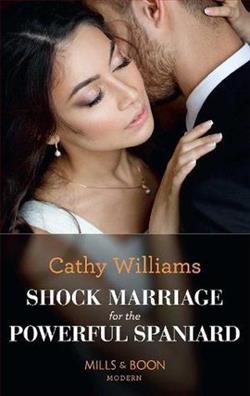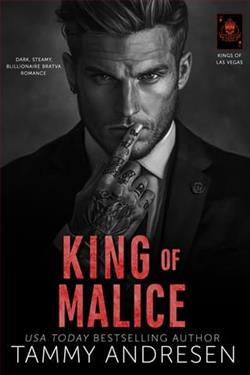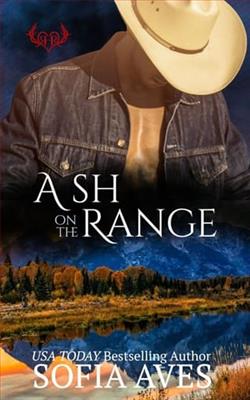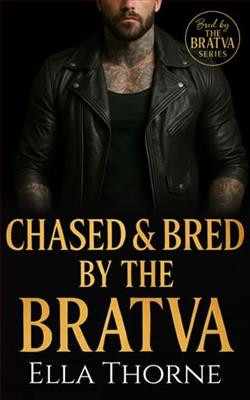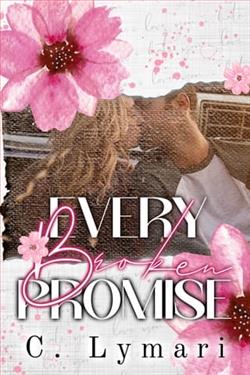Page 49 of Warrior Queen
When we’d finished eating, Ystradwel took me on a tour of the palace, ending in the royal nursery where two little boys were playing with a pair of wheeled wooden horses, riding them at each other like a pair of warriors, under the watchful gaze of a rotund nursemaid.
“My great grandsons. This kingdom’s future,” Ystradwel said, a hint of sadness in her voice. “The bigger one is Bran, the younger Cyngal.”
“I won,” shouted Bran, a sturdy, dark-haired child, as his brother took a tumble from his horse, a beast someone artistic had rendered dapple gray. “That’s three times I’ve beaten you. That makes me king for today.”
Cyngal scrambled to his feet, his lower lip jutting rebelliously.
A pang of sadness seized my heart, and I had to swallow the lump in my throat. How like Amhar he was. The same age, similar dark hair, arms and legs still round with the chubbiness of babyhood.
Ystradwel touched my arm. “I’m sorry. Has this upset you?”
I swallowed again but the lump wouldn’t go. “It’s just that I miss my children.”
She nodded. “They’re not ours long enough, are they? Especially not the boys.”
Especially not the boys.
“I had eight children.” Ystradwel lowered her voice, probably so the little boys, who’d remounted for a second charge, wouldn’t hear. “Two girls and six boys. Now I have only two sons left living.” She shook her head in sad resignation. “One of my daughters entered a nunnery and died there of the wasting sickness. The other married well but died young, birthing her first child.” She put her hands on her hips. “Not made like me with hips for birthing, you see. Too young, too young…” She shook her head.
I thought of Coventina and the Caesarean section Donella and I had performed on her. Not for the first time I wished I’d arrived here in the fifth century with something useful I could contribute. Yes, the army were touchingly convinced I brought them luck, but that wasn’t true, and I’d rather have had some practical skill. Medical knowledge beyond a first aid course would have been helpful.
“And your sons?” I asked, sensing the old queen wanted to tell me more.
Ystradwel sank down onto a cushioned bench at the side of the room, eyes still on the two children. “My first born, Tegfan, named for his grandfather, caught a chill one winter before he was even five. He was gone in less than three days.” Now her gaze stretched beyond the boys, as though looking back in time to when her own children had played here in this nursery– perhaps with the same wooden horses. “Garbaniawn is my second born, always a strong lad. He’s these boys’ grandfather.”
She chuckled. “He’s fat and bald now, and looks older than his father. I sometimes wonder if my grandson, these boys’ father, will follow my husband as king instead of our son.” For a long minute she stared ahead of herself, lost in her remembrances, before continuing. “As to the others, Ceneu is a priest, and Dwfwr fell long ago in battle. Urban died fighting the Saxons a few short weeks ago. Eudos fell from his horse as a young man, out hunting, and was kicked in the head. I sat with him a week, hoping that God would bring him back to me. God didn’t listen to my prayers. My youngest and best son died without ever opening his eyes again.”
She sighed. “I’m sorry. I shouldn’t be telling you my troubles. I’m lucky, really– I have Garbaniawn and his son and grandsons. I love my little ones.”
The boys had given up on their horses and were lining up rows of wooden warriors, gaudily painted simple conical figures, facing each other across an imaginary stone-flagged battlefield. Indoctrinated from birth, one day these little boys would be as fearsome warriors as the men who fought for their great-grandfather. Unless, like the unknown Ceneu, they entered the church. And even that wasn’t safe, as I’d seen firsthand at Breguoin.
*
By evening ourarmy had squeezed itself within Ebrauc’s walls. No mean feat as there were so many warriors and horses. But luckily, plenty of gaps existed between buildings where horses could be tethered and bivouacs set up. As night fell, campfires sprang to life all over Ebrauc’s small, intramural fields, but with little of the usual carousing the men liked. Mindful of my warning that the Saxons were on their way, Arthur had given orders that no man was to get drunk. And they were to keep the noise down, in the hope the Saxons, should they arrive, would not know a new, and large, army had reinforced Coel’s own battle-depleted force.
That night, Arthur and I dined in the king’s hall, a long, thatched building cobbled onto the side of the predominantly Roman palace, as so many kings’ halls were. Although not quite so big as the hall at Din Cadan, it was impressive, nevertheless. A wide high table occupied one end, where Arthur and I were seated to either side of Coel and Ystradwel. The remaining seats belonged to Garbaniawn, a man as fat, bald and elderly as his mother had described, and Exuperius, Bishop of Ebrauc, a short, scrawny man in clergyman’s robes, with a continuous drip on the end of his long nose.
Cei and Merlin had to make do with seats in the body of the hall with Garbaniawn’s warrior son, a well-built young man still in possession of a fine head of hair. The snowy head of Cadman, and some of his fellow messengers, stood out amongst tables closely crowded with ranks of Coel’s foremost warriors.
I’d seen a number of kings’ halls during my time in the fifth century, so this one came as no surprise. Rushes from the nearby riverbanks covered the flagstone floor, and sigil emblazoned shields festooned the walls. Despite the summer’s warmth, a huge fire burned in a central hearth, sending smoke curling up to hang among the blackened rafters and filter through the thatch. No chimneys this far back in history, and definitely no smoke holes– that would have made the draft so vicious the chance of the roof catching fire would have been enormous.
Torches burned in iron brackets along the walls, insufficient to light the hall well, but enough to add to the general fug of smoke, sweaty bodies, food, and a slight undertone of urine wafting up from the rushes.
Coel had set me on his right-hand side, with Arthur to the left of Ystradwel, so I had no chance to talk to my husband. As the night progressed, the old king’s reason became clear.
He was a charming man, a leonine silver fox, showing few of his probable eighty years, and it took him no time to make it obvious he liked me a lot. A bit too much, in fact.
“Do you like to hunt?” he asked, as I put my hand over my goblet for the sixth time to stop the servant hovering behind me from filling it up. He had to nearly shout to make himself heard above the din of voices from the body of the hall.
“Not really,” I said, which was true. “I like the riding, the galloping, but not the kill. It turns my stomach.”
He grinned, showing me his yellowed teeth– remarkably all present as far as I could see, if a trifle wonky. Well, not a lot of sweet things to rot them. His eyes held a twinkle a younger man would have been proud of. “And yet your reputation goes before you. You have killed more than one man. Quite the warrior queen.”
Not exactly an accurate reputation, it seemed. I shook my head. “Just the one. And I helped a friend kill the other, or he would have killed her.” For something to do with my hands, I pushed a lump of tough meat I hadn’t been able to eat around my plate. “But how do you know?”
He shook his shaggy head, his eyebrows waggling at me like fat white caterpillars perched precariously just above his eyes. “The Wall is not so far. We get all the news down here. I even know that it was you who suggested snatching the scaling ladders when the foolish Dogmen left them outside Vindolanda’s walls.” He smiled again. “I trust the luck you bring will be evident here as well, when the Saxon army you predicted arrives.”
Not really anything I could say to that. A bit like when someone tells you you’re clever, or pretty, or some other flattery. What are you supposed to reply? Thank you, and sound smug? I took a tiny sip of wine– golden, unwatered, and a little bitter.








